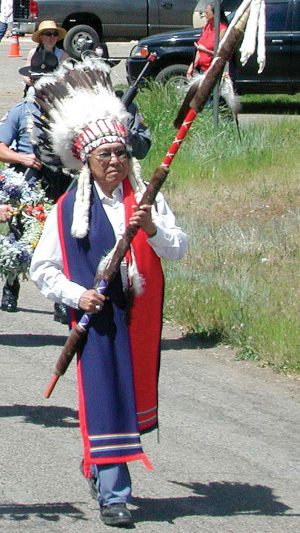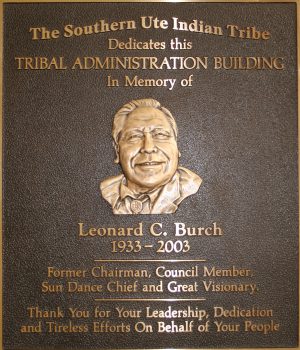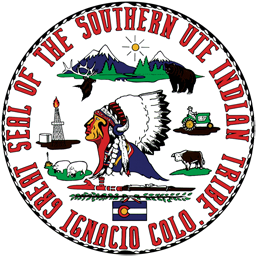This information is provided as a background on why we celebrate Leonard C. Burch Day. This day of recognition was established on December 10, 1996 and is celebrated each year as a tribal holiday.
Leonard C. Burch, 1933-2003, long time leader of the Southern Ute Indian Tribe, died at Mercy Medical Center shortly after sunrise on August 1, 2003, following a cardiac arrest suffered the previous day. He was 69 years old.

Mr. Burch’s retirement in December 2002 brought to a close a brilliant political career. He served as Chairman of the Southern Ute Indian Tribal Council for more than 32 years commencing with his first election as Chairman in 1966. Under his leadership, the Southern Ute Tribe emerged from relative poverty to become a major economic force in the Four Comers Region and the largest employer in La Plata County. Fueled principally by successful development of the Tribe’s natural gas resources, the Burch era saw countless examples of community development and improvements in education, health and social programs available to tribal members.
Upon graduating from Ute Vocational High School in 1954, Mr. Burch enlisted in the United States Air Force. His four years of military service included a tour of duty in Turkey. Upon his return to the Southern Ute Indian Reservations, he spent five years working in the Realty Office of the Bureau of Indian Affairs, where he became familiar with oil and gas leasing and land title matters. During this same period, he married Irene Coolidge, a Navajo tribal member who had also attended Ute Vocational School in Ignacio. As soon as he became eligible under the Tribe’s Constitution he ran successfully for a position on the Tribal Council and, at the age of 32, was selected by his fellow Council members as Chairman. For more than three decades he was re-elected as Chairman of the Tribe with the exception of intermittent breaks mandated by term limitations set forth in the Tribes Constitution.
While a strong voice for tribal self-determination, he was also committed to maintaining cooperative relationships with the United States Government, the State of Colorado and neighboring governments. He was invited by five separate United States Presidents to attend conferences on Indian policy at the White House. During his tenure he appeared innumerable times before Committees of Congress on matters affecting the Tribe and Southwestern Colorado. He successfully obtained passage of federal laws permitting the Tribe to consolidate land holdings within the reservation and addressing complex jurisdictional issues. The gaming compact between the State of Colorado and the Tribe and a taxation compact among the State of Colorado, the County of La Plata and the Tribe were each negotiated during his tenure in office.
 Mr. Burch was also noted for his commitment to regional water resource development. He helped forge a coalition of Indian and non-Indian water users in southwestern Colorado to advocate for construction of the Animas-La Plata Project, a water storage facility built by the Bureau of Reclamation as part of a settlement of the Tribe’s water rights claims. In recognition of his role in this regard, he received the Citizens Award from the United States Bureau of Reclamation. Mr. Burch’s cooperative practices were also reflected in other matters. For example, the Tribe’s water treatment and waste water treatment facilities constructed by the Tribe during his tenure continue to provide services to both Indian and non-Indian communities within the Reservation. He received numerous awards in recognition of his lifetime achievements and contributions, including the Durango Area Citizen of the Year Award (1997), the 15th Annual Martin Luther King Humanitarian Award (2000) and the Council of Energy Resource Tribes’ Achievement Award (2002).
Mr. Burch was also noted for his commitment to regional water resource development. He helped forge a coalition of Indian and non-Indian water users in southwestern Colorado to advocate for construction of the Animas-La Plata Project, a water storage facility built by the Bureau of Reclamation as part of a settlement of the Tribe’s water rights claims. In recognition of his role in this regard, he received the Citizens Award from the United States Bureau of Reclamation. Mr. Burch’s cooperative practices were also reflected in other matters. For example, the Tribe’s water treatment and waste water treatment facilities constructed by the Tribe during his tenure continue to provide services to both Indian and non-Indian communities within the Reservation. He received numerous awards in recognition of his lifetime achievements and contributions, including the Durango Area Citizen of the Year Award (1997), the 15th Annual Martin Luther King Humanitarian Award (2000) and the Council of Energy Resource Tribes’ Achievement Award (2002).
In the later years of his career he worked closely with other members of the Tribal Council to establish and implement successful financial investments both on and off the Reservation. The financial progress of the Tribe has been widely touted as a model for Indian tribes throughout the country.
Throughout his life, Mr. Burch remained respectful of the culture and traditional ways of the Ute people. He participated continuously in the Southern Ute Indian Tribe’s Sundance as both a dancer and Sundance Chief and he supported programs to preserve the Ute language and the Tribe’s museum.
His life was one of dedication and service to his family, the Southern Ute Indian Tribe and the Four Corners Region.
